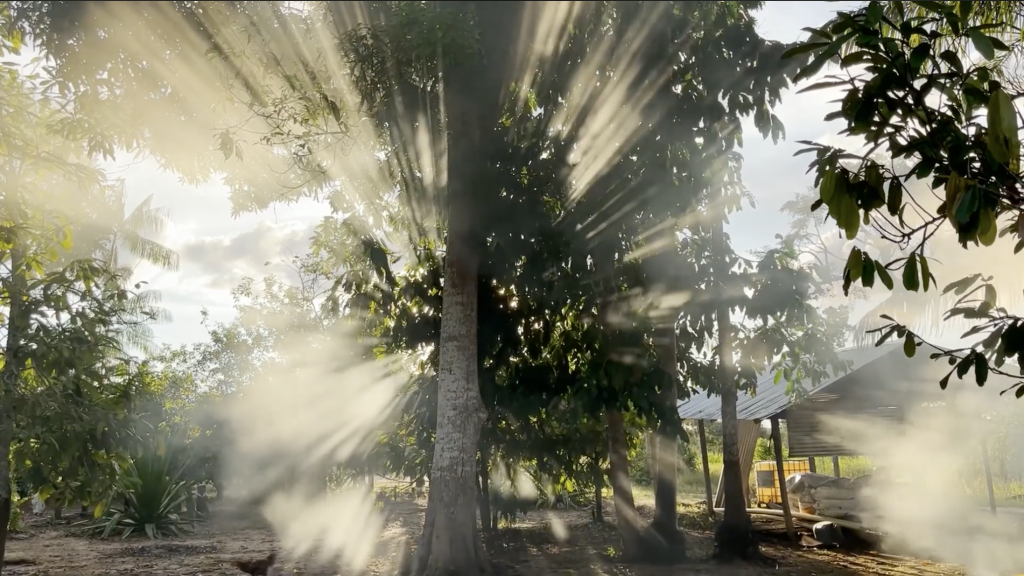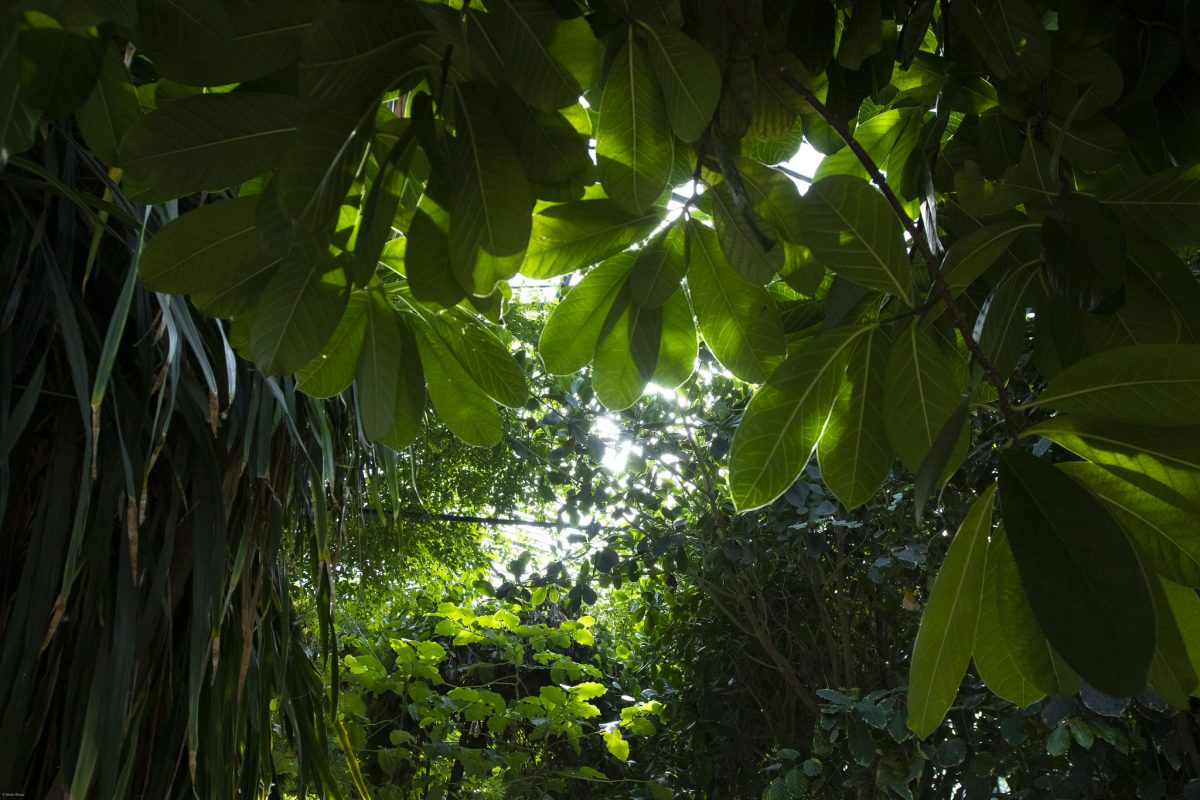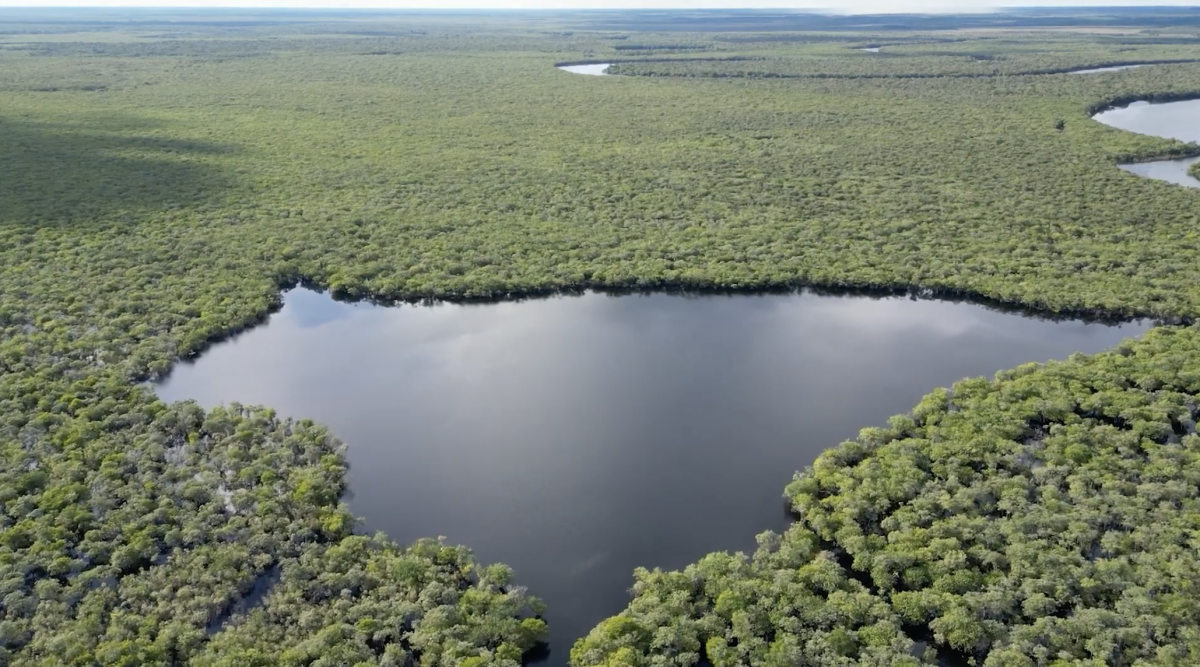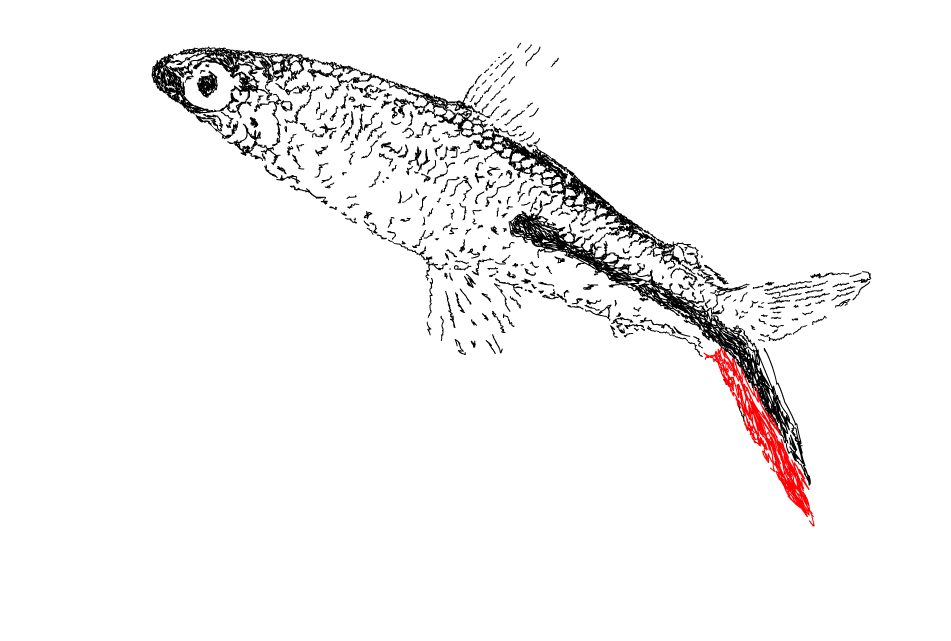Reflejos y apetitos (Reflections and Appetites)
(Reflexiones personales tras la residencia)
Existe un espejo de agua vivo en el caño de Mataven, proviene de aguas calmas color negro, respira, crece, decrece, refleja todo y protege lo que en su profundidad guarda.
Existe en el ojo humano una búsqueda por reflejo que domesWca el comportamiento, una condición miméWca a lo que vemos y así los reflejos determinan nuestra forma de exisWr. A la sofisWcada biotecnología del espejo de agua nos ha sido imposible llegar, no hay actualización más veloz, pero del agua al cristal, del vidrio al espejo, del espejo a la pantalla, de la pantalla a la realidad y así sucesivamente.
ExisWr cambió su orden ante la presencia de un reflejo tan potente y disWnto en Mataven, reconocí mi cuerpo atrofiado a la realidad de la naturaleza, no reconocía mi reflejo acostumbrado, en senWdo literal y metafórico.
Otro orden apareció, uno en el que los peces son polinizadores, los troncos están bajo el agua, mis piernas y brazos sin entrenamiento, mi cuerpo comido de insectos, mi intesWno desprovisto de bacterias y mis saberes en una tensión insostenible y constante que me acercaban y alejaban de los humanos al rededor.
Intento recordar a que se refería ese orden diferente y no consigo describirlo por no estar ante la presencia del espejo de agua.
Suele idealizarse la idea de lo indígena que, por inasequible, seguirá siendo imaginado. Se ha idealizado hacia lo despreciable y en el giro caóWco del Antropoceno se idealiza hacia la solución. Cualquiera de las dos formas, por opuestas que parezcan nacen de lo inasequible, del mismo espíritu.
“Las cosas se llaman unas a otras,
lo igual con lo igual;
un dragón trayendo lluvia;
un abanico apartando el calor;
el siHo donde ha estado un ejército,
llenándose de zarzas…
Las cosas, hermosas o repulsivas,
Henen todas un origen.
Si se cree que construyen el desHno es porque nadie conoce dónde está su origen. No hay ningún suceso que no dependa para su inicio de algo anterior,
a lo que responde porque pertenece a la misma categoría,
y por eso se mueve”
Dong Zhongshu (Dinastía Han occidental China)
Con esto hablar de lo indígena, como idea inasequible y dar evidencia de una confirmación tras la experiencia: No quiero pasar por ingenua y no reconocerme como parte de los métodos depredadores del sistema: Tengo hambre y apetito. La globalización y el capitalismo son procesos filosóficos y emocionales profundamente arraigados que generalizan, imponen y devoran saberes.
Existe una esencia depredadora de la diversidad en las formas de existencia, que comprende tecnologías y biotecnologías de entidades naturales; se viste de intento por entenderlas, por tomar de aquí y allá para entender la propia existencia.
En otras palabras, si un grupo de artistas se lanza a experimentar una convivencia inusual y larga en una comunidad indígena, gracias al trabajo de organizadores, presupuestos y pensamientos que lo hace posible, representa en una amplitud de matices, el mismo método hacia la perdida de la diversidad cultural y síntoma de ella, es decir, un intento ingenuamente genuino del capitalismo en metástasis depredadora.
No es de subestimar y queda la evidencia de que existe un reflejo desconocido. Sentí dislocado el orden de la existencia y un no retorno hacia la homogenización cultural que imponemos desde lo más profundo, del sistema al que pertenezco. Tengo apetito y con hambre se es temerario, indolente y depredador.
Es imposible e ingenuo hackear presupuestos públicos europeos a beneficio de la diversidad cultural o ambiental porque hace parte de su misma estrategia homogeneizadora, sin embargo, al ser una de las células de la metástasis del capitalismo colonial hubo un intercambio, saciar el apetito al ser presa del depredador, al menos por un momento. Con esto no quiero desmeritar el intento y seguirán tornándose cada vez más sofisticados los métodos de homogenización depredadora, en la carne de cañón de estas operaciones algo se devuelve y en el intercambio hay beneficio para ambas partes, pero es importante señalar la paradoja interna de estos procesos, el apetito devorador es incontrolable.
Como estocada final y no menor, la residencia terminó en UK y se trataba de un lugar igual de desconocido y folclórico. Aun con apetito y hambre, habitar Mataven y Londres resultó igual de desconcertante, otro reflejo, otro río, el cuerpo en los dos casos igual de desprovisto e inadaptado.
Quien se reconoce depredador aprende a no cazar su reflejo, se asusta ante él, se esconde y lo ignora.

There exists a living water mirror in the Mataven stream, originating from calm black waters, it breathes, grows, diminishes, reflects everything, and protects what it holds in its depths.
Within the human eye lies a search for reflection that tames behavior, a mimetic condition to what we see, and thus, reflections determine our way of existing. The sophisticated biotechnology of the water mirror has remained elusive to us, there is no faster update. But from water to glass, from glass to mirror, from mirror to screen, from screen to reality, and so on.
Existence changed its order in the presence of such a powerful and different reflection in Mataven. I recognized my atrophied body in relation to the reality of nature. I didn’t recognize my accustomed reflection, both in a literal and metaphorical sense.
Another order emerged, one where fish act as pollinators, tree trunks lie beneath the water, my untrained legs and arms, my body eaten by insects, my gut devoid of bacteria, and my knowledge in a constant and unsustainable tension that drew me closer and farther away from the humans around me. I try to remember what that different order referred to, but I cannot describe it since I am not in the presence of the water mirror.
Indigenous identity is often idealized because it remains unattainable, existing only in our imagination. It has been idealized as something despicable, and in the chaotic turn of the Anthropocene, it is idealized as the solution. Both forms, as opposing as they may seem, arise from the unattainable, from the same spirit.
“Things call out to each other,
the similar to the similar;
a dragon bringing rain;
a fan dispersing heat;
the place where an army has been,
overgrown with thorns…
Things, beautiful or repulsive,
all have an origin.
If it is believed that they construct destiny, it is because no one knows where their origin lies. There is no event that does not depend on something preceding it,
to which it responds because it belongs to the same category,
and that is why it moves.”
Dong Zhongshu
(Western Han Dynasty, China)
With this, I speak of indigeneity as an unattainable idea and provide evidence of confirmation through experience. I don’t want to be naive and fail to recognize my role in the predatory methods of the system. I am hungry and have appetites. Globalization and capitalism are deeply ingrained philosophical and emotional processes that generalize, impose, and consume knowledge.
There exists a predatory essence of diversity in the forms of existence, which includes technologies and biotechnologies of natural entities. It disguises itself as an attempt to understand them, to take bits and pieces from here and there to comprehend our own existence.
In other words, if a group of artists embark on an unusual and prolonged coexistence within an indigenous community, thanks to the work of organizers, budgets, and thoughts that make it possible, it represents, in a myriad of nuances, the same method that leads to the loss of cultural diversity and is a symptom of it. It is an ingenuously genuine attempt by capitalism in its predatory metastasis.
It should not be underestimated, and the evidence remains that an unknown reflection exists. I felt the order of existence dislocated, and a non-return to the cultural homogenization we impose from the depths of the system to which I belong. I am hungry, and with hunger, one becomes reckless, callous, and predatory.
It is impossible and naive to hack European public budgets for the benefit of cultural or environmental diversity because it is part of their very homogenizing strategy. However, being one of the cells of colonial capitalism’s metastasis, there was an exchange, satisfying the appetite by becoming prey of the predator, at least for a moment. I do not want to diminish the effort, and the methods of predatory homogenization will continue to become increasingly sophisticated. In the cannon fodder of these operations, something is returned and there is benefit for both parties in the exchange, but it is important to highlight the internal paradox of these processes—the insatiable devouring appetite is uncontrollable.
As a final and no less significant blow, the residency ended up in the UK, which was an equally unfamiliar and folkloric place. Even with appetite and hunger, inhabiting Mataven and London proved equally bewildering—another reflection, another river, the body equally devoid and unadapted in both cases.
Those who recognize themselves as predators learn not to hunt their own reflection, they are frightened by it, they hide and ignore it.



